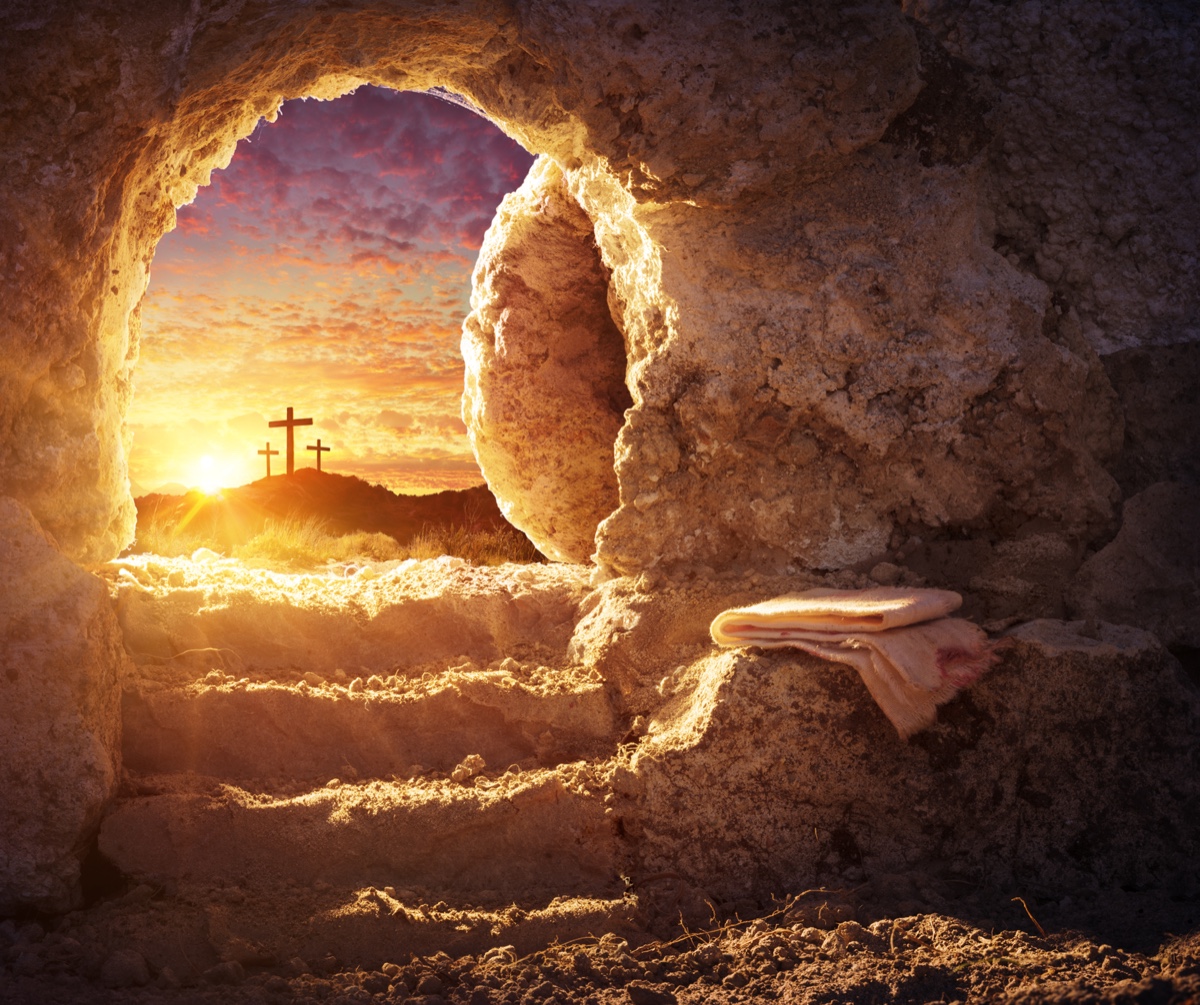by Luke Reeves
Synopsis: We remember Jesus’s death as the perfect atonement for our sins and His resurrection as the validation of our faith.
“Do this in remembrance of me” is a familiar phrase to Christians. A direct reference to Christ’s command in Luke 22:19 and echoed in 1 Corinthians 11:24, it has become the motto of our weekly remembrance, known as the Lord’s Supper.
Remembrance and reflection transform the otherwise mundane acts of eating and drinking into a special moment during our worship. As we contemplate Jesus’s death and resurrection, we should keep two principal ideas in mind: the significance of Jesus’s death lies (1) in the fulfillment of prophecy and (2) the perfect atonement for our sins. Furthermore, the power of His sacrifice derives from His resurrection, a demonstration of His sovereign power and victory over the ultimate consequence of sin—death.
We are accustomed to honoring a person after his death. Funerals, memorials, and celebrations of life are common forms of expressing our appreciation for the deceased and condolences to the bereaved. We consider ourselves to have benefitted from his death; we feel that we have lost rather than gained.
Death is framed differently at military funerals. While the fallen soldier will certainly be missed by his friends and family, we recognize his death as a price paid for our freedom and security. Under these circumstances, we shift our thoughts toward what we have gained from his death, and share a sense of indebtedness.
Remembering the death of Jesus is like the latter scenario—to a much greater degree. We don’t remember to contribute anything to His legacy per se. Instead, we recognize our indebtedness to Him and soberly reflect upon our hand in His crucifixion. The analogy, of course, is imperfect. As honorable as a soldier’s death may be, it’s a sacrifice with lesser impact. Military conflicts take a lot of lives before peace is declared—one life is never sufficient. Rarely does a soldier die voluntarily. Jesus’s sacrifice, on the other hand, is the perfect sacrifice. His death was sufficient to atone for the sins of all humanity. He died under complete submission.
The Biblical narrative clearly highlights the significance of the crucifixion. John the Baptist recognized it early in Jesus’s ministry, proclaiming, “Behold, the Lamb of God, who takes away the sin of the world!” (John 1:29). Hear it again: The sin of the world.
Jesus’s atonement was powerful—so powerful—that it warranted the establishment of a new covenant. By saying, “This cup that is poured out for you is the new covenant in my blood” (Luke 22:19-20), Jesus indicated that a transition was occurring from the atonement provided by the Mosaic Law to the establishment of something greater. The old covenant was imperfect. It was time for it to be superseded by a new pact made perfect in the sinlessness of Christ.
What was the basis for this new covenant? 1 Corinthians 11:23-25, mirroring Luke 22, states that it is the body of Christ that was given for us and His shed blood that paid the price of our sins. In offering Himself as a perfect sacrifice, Jesus replaced both the human high priest and the animal sacrifices of the Old Testament. In doing so, He “died to sin once for all” (Rom. 6:10).
If the Jews had understood the Scriptures, they would have recognized that Jesus Christ was destined to die. Old Testament prophecy foretold the coming of the Messiah and His ultimate crucifixion. The psalmist referenced His suffering, writing, “For dogs encompass me; a company of evildoers encircles me; they have pierced my hands and feet—I can count all my bones—they stare and gloat over me; they divide my garments among them, and for my clothing they cast lots” (Ps. 22:16-18).
Prophecy would go beyond foretelling the crucifixion, detailing the psychological torture Christ would undergo as well. In the moments leading up to His death, Jesus finds Himself increasingly alone, left to fend for Himself before the Jews that sought to kill Him. The psalmist elaborates on this event poetically, stating, “Many bulls encompass me; strong bulls of Bashan surround me; they open wide their mouths at me, like a ravening and roaring lion” (Ps. 22:12-13) Denounced by many, denied by the apostle Peter, and abandoned by His closest disciples who fled, Jesus faced the cross alone. The prophet Isaiah brought attention to this in chapter 53: “He was despised and rejected by men, a man of sorrows and acquainted with grief; and as one from whom men hide their faces he was despised, and we esteemed him not” (v. 3).
A perfect atonement and precise fulfillment of prophecy, the death of Jesus was a critical element in the plan for our redemption. It established a new covenant through which we have a direct connection with our Father. Jesus’s command aside, the nature of His sacrifice alone warrants our reflection. Let us remember that He died in our stead (1 Pet. 2:25; Gal. 2:20b)!
While we focus on the sacrifice of Jesus, let’s not forget an equally important event that followed—the resurrection. The apostles emphasized it greatly in their letters. Why so? Because the resurrection would be the ultimate evidence of His power as the Son of God. In the letter to the Romans, the apostle Paul wrote that Jesus “was declared to be the Son of God in power according to the Spirit of holiness by his resurrection from the dead” (Rom. 1:4) Throughout His ministry, Jesus used signs and miracles to prove His divinity. Some of these included the resurrection of the dead (i.e., Lazarus; etc.). Nevertheless, raising Himself from the dead would be an act of sovereign power.
Moreover, we are assured that the Father shows us the same power used to raise the Son. Ephesians 1:17-21 states, “You may know. . . the immeasurable greatness of His power toward us who believe, according to the working of His great might that He worked in Christ when He raised Him from the dead and seated Him. . . far above all rule and authority and power and dominion.” Knowing this power will enlighten the eyes of our heart and serve as our source of hope.
The resurrection also validates our salvation. 1 Corinthians 15:14 states, “If Christ has not been raised, then our preaching is in vain and your faith is in vain.” The apostle Paul reiterates this later, writing that, without the resurrection of Jesus, “our faith is futile,” and we would “still be in our sins” (1 Cor. 15:17) Paul’s axiom goes to great lengths to highlight the event’s significance—and with good reason. Everything that Jesus ever claimed and promised hinges on His reappearance. Through it, Jesus’s “I am” statements have authority, and His promises of our resurrection are made sure.
To be more specific, Jesus’s resurrection doesn’t just designate Him as powerful—it crowns Him as Victor over death. At that moment, He would ultimately “destroy the one who has the power of death, that is, the devil” (Heb. 2:14), and “draw all people” to Himself (John 12:31-32). What a powerful conclusion to God’s plan! In the resurrection, the sacrifice on the cross is made complete, and we can come to Jesus.
The gravity of Jesus’s death and resurrection merit our remembrance, but not in the way we pay respects to an old friend or a fallen soldier. Rather, it prompts us to reflect on His death as a fulfillment of prophecy as well as our atonement; we remember His resurrection as a demonstration of His power over death. This is the foundation of our faith. Therefore we preach a “Christ [who was] crucified” and “raised from the dead.”


